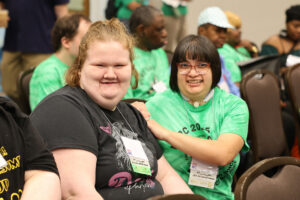 July 26, 1990, marks a significant moment in the history of civil rights for people with disabilities in the United States. On this day, President George H.W. Bush signed the Americans with Disabilities Act (ADA) into law, bringing a new era of equality and inclusivity for millions of Americans with disabilities. Today, we reflect on this milestone and why it’s essential to understand why the ADA is not just a piece of legislation but a beacon of hope and empowerment, especially for organizations like Emmaus.
July 26, 1990, marks a significant moment in the history of civil rights for people with disabilities in the United States. On this day, President George H.W. Bush signed the Americans with Disabilities Act (ADA) into law, bringing a new era of equality and inclusivity for millions of Americans with disabilities. Today, we reflect on this milestone and why it’s essential to understand why the ADA is not just a piece of legislation but a beacon of hope and empowerment, especially for organizations like Emmaus.
The Significance of the ADA
The ADA is a comprehensive civil rights law that prohibits discrimination against individuals with disabilities in all areas of public life, including jobs, schools, transportation, and all public and private places open to the general public. Modeled after the Civil Rights Act of 1964, the ADA ensures that people with disabilities have the same rights and opportunities as everyone else.
Here are some key areas impacted by the ADA:
1. Employment: The ADA makes it illegal to discriminate against qualified individuals with disabilities in all aspects of employment. From hiring to promotions, training, pay, and other employment areas.
2. Public Services: State and local governments must provide individuals with disabilities equal access to their programs, services, and activities. Including public transportation systems ensures they have the freedom of mobility they desire.
3. Public Accommodations: Businesses and nonprofit service providers must comply with basic nondiscrimination requirements prohibiting exclusion, segregation, and unequal treatment.
4. Telecommunications: The ADA requires telephone and Internet companies to provide a nationwide relay service system that allows individuals with hearing or speech disabilities to communicate over the phone.
Why the ADA Matters to Emmaus
The ADA’s principles resonate deeply with Emmaus’ mission to enrich the lives of individuals of all beliefs, with cognitive or developmental disabilities, by fostering independence, inclusion, and self-advocacy.
Here’s why the ADA is crucial to our work:
1. Empowerment Through Employment: The ADA’s employment protections align with our goal of empowering individuals through meaningful work opportunities. By advocating for fair hiring practices and workplace accommodations, we help our clients achieve financial independence and a sense of purpose they are capable of and desire.
2. Accessible Education and Training: Ensuring that educational programs are accessible is a core tenet of the ADA. At Emmaus, we strive to create inclusive environments where everyone can thrive, regardless of their abilities.
3. Community Inclusion: The ADA promotes the full participation of people with disabilities in community life. We aim to break down barriers and foster belonging through social activities, skill-building workshops, or community engagement initiatives where our clients live and work.
4. Advocacy and Awareness: The ADA has paved the way for greater advocacy and awareness around disability rights. Through initiatives like Coffee’s for Change, led by our Advocacy Director, Christina Ingoglia, we educate our community about legislative matters that affect our community and strive for effective communication with policymakers working towards change.
Continuing the Legacy
As we celebrate the anniversary of the ADA, we are aware of the progress made, the limitations still needing to be overcome, and the work ahead. Emmaus remains committed to advocating for the rights of individuals with disabilities and ensuring they have the resources and opportunities needed to lead fulfilling lives.
The ADA is more than just a law; it is a testament to the power of advocacy and the unwavering belief in equality for all. We honor this legacy by continuing to educate, advocate for, and elevate our community, ensuring that every individual has the chance to reach their full potential. Let us celebrate the ADA’s impact and reaffirm our commitment to a more inclusive and equitable world for everyone.


